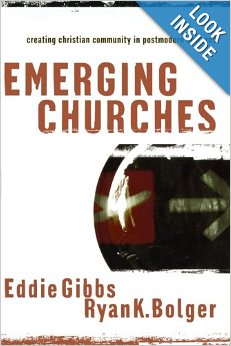Emerging Churches, by Eddie Gibbs & Ryan Bolger
Eddie Gibbs and Ryan K. Bolger. Emerging Churches: Creating Christian Community in Postmodern Cultures.
Book Review submitted by Xochitl Alvizo, Ph.D. Candidate in Practical Theology, Concentration: Congregation and Community
Eddie Gibbs and Ryan K. Bolger conducted an investigation on “the nature of emerging churches and movements,” churches and movements that they consider to be “vibrant and alive” (329). From their study with such churches, Gibbs and Bolger identified nine practices as common among emerging churches, three of them being the core practices out of which the others flow. Overall I was impressed with how much I agreed with the authors; they offered a most generous read on the theologies and practices they encountered through their research and also framed the intentions of the emerging church ministers/founders’ in the best possible light. It is clear that the authors believe that emerging churches are making a valuable and necessary contribution to the church at large, even while pointing out potential weaknesses, or the challenges that will need addressing.
Gibbs and Bolger refer to themselves as interpreters and commentators of the research, and in as much as their book is made up of material from their interviews with emerging church leaders, they state that they are not the authors of much of the material in their book (237). Their objective was to capture a “snapshot of a rapidly changing scenario” and introduce the emerging church movement (and the postmodern culture to which it is trying to minister) to church leaders who “may as yet be unaware of the significant developments taking place” (238). The authors definitely seem to have accomplished their mission, but they do so without offering much of their own theological reflection or critique. They function more like sociologists.
I recall attending a session at the
It is clear from the congregations that Gibbs and Bolger studied that each of these are born out of their particular context, the particular concerns of the people involved, and out of the participants’ desire to be a more faithful church (even in the different ways they understand faithfulness). However, I worry that when we study new congregational phenomenon we do so in such a way that strips the congregations of their integrity, that reduces them to a consumable good, and if found worthy, offers them as something to be replicated – or if found unworthy, tears them to theological shreds.
In the acknowledgements and the conclusion, Gibbs and Bolger express their gratitude to the congregations who welcomed them and also recognize that many of these congregations are “new, fragile, vulnerable, and in locations subject to rapid change;” however, I wonder if that is enough. As practical theologians who will engage in our own research with congregations, how do we proceed in a way that encourages and supports congregations in their communal efforts toward faithfulness, does not make them into a consumable products, and honors the particularity and vulnerability of their own journey, even while they contribute to ours?
